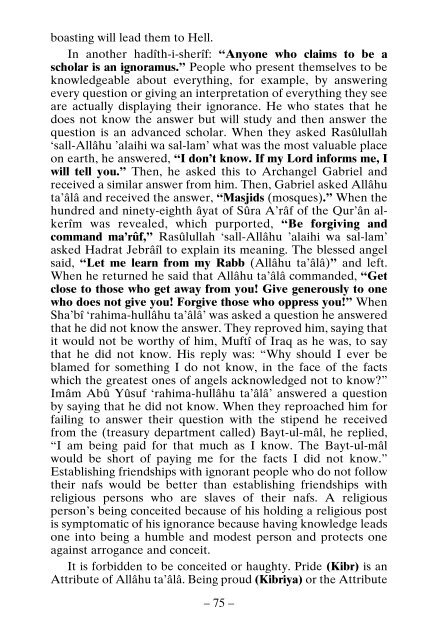Ethics of Islam
Ethics of Islam is taken from the book Berîka by Muhammad Hâdimi. Immorality and ways to get rid of it; 40 depravities and cures to them; usefulness of ethics; what is a soul; strengths of a soul; Personalities emanating from wisdom, courage, chastity and justice are extensively explained.
Ethics of Islam is taken from the book Berîka by Muhammad Hâdimi. Immorality and ways to get rid of it; 40 depravities and cures to them; usefulness of ethics; what is a soul; strengths of a soul; Personalities emanating from wisdom, courage, chastity and justice are extensively explained.
Create successful ePaper yourself
Turn your PDF publications into a flip-book with our unique Google optimized e-Paper software.
oasting will lead them to Hell.<br />
In another hadîth-i-sherîf: “Anyone who claims to be a<br />
scholar is an ignoramus.” People who present themselves to be<br />
knowledgeable about everything, for example, by answering<br />
every question or giving an interpretation <strong>of</strong> everything they see<br />
are actually displaying their ignorance. He who states that he<br />
does not know the answer but will study and then answer the<br />
question is an advanced scholar. When they asked Rasûlullah<br />
‘sall-Allâhu ’alaihi wa sal-lam’ what was the most valuable place<br />
on earth, he answered, “I don’t know. If my Lord informs me, I<br />
will tell you.” Then, he asked this to Archangel Gabriel and<br />
received a similar answer from him. Then, Gabriel asked Allâhu<br />
ta’âlâ and received the answer, “Masjids (mosques).” When the<br />
hundred and ninety-eighth âyat <strong>of</strong> Sûra A’râf <strong>of</strong> the Qur’ân alkerîm<br />
was revealed, which purported, “Be forgiving and<br />
command ma’rûf,” Rasûlullah ‘sall-Allâhu ’alaihi wa sal-lam’<br />
asked Hadrat Jebrâîl to explain its meaning. The blessed angel<br />
said, “Let me learn from my Rabb (Allâhu ta’âlâ)” and left.<br />
When he returned he said that Allâhu ta’âlâ commanded, “Get<br />
close to those who get away from you! Give generously to one<br />
who does not give you! Forgive those who oppress you!” When<br />
Sha’bî ‘rahima-hullâhu ta’âlâ’ was asked a question he answered<br />
that he did not know the answer. They reproved him, saying that<br />
it would not be worthy <strong>of</strong> him, Muftî <strong>of</strong> Iraq as he was, to say<br />
that he did not know. His reply was: “Why should I ever be<br />
blamed for something I do not know, in the face <strong>of</strong> the facts<br />
which the greatest ones <strong>of</strong> angels acknowledged not to know?”<br />
Imâm Abû Yûsuf ‘rahima-hullâhu ta’âlâ’ answered a question<br />
by saying that he did not know. When they reproached him for<br />
failing to answer their question with the stipend he received<br />
from the (treasury department called) Bayt-ul-mâl, he replied,<br />
“I am being paid for that much as I know. The Bayt-ul-mâl<br />
would be short <strong>of</strong> paying me for the facts I did not know.”<br />
Establishing friendships with ignorant people who do not follow<br />
their nafs would be better than establishing friendships with<br />
religious persons who are slaves <strong>of</strong> their nafs. A religious<br />
person’s being conceited because <strong>of</strong> his holding a religious post<br />
is symptomatic <strong>of</strong> his ignorance because having knowledge leads<br />
one into being a humble and modest person and protects one<br />
against arrogance and conceit.<br />
It is forbidden to be conceited or haughty. Pride (Kibr) is an<br />
Attribute <strong>of</strong> Allâhu ta’âlâ. Being proud (Kibriya) or the Attribute<br />
– 75 –

















